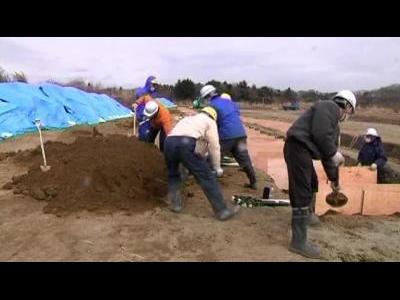 AFP/TEPCO VIA JIJI PRESS – Workers spray water to cool down the spent nuclear fuel in the fourth reactor building at Fukushima No.1 …
AFP/TEPCO VIA JIJI PRESS – Workers spray water to cool down the spent nuclear fuel in the fourth reactor building at Fukushima No.1 … In the aftermath of the 9.0-magnitude earthquake and the tsunami that caused massive destruction, Japan now faces the threat of nuclear radiation exposure. The fear of a meltdown at the Fukushima Daiichi plant raises health questions about the radiation risk and long-term effects on the population exposed.
Radioactivity can be carried by the wind, as seen in 1986 at Chernobyl in the former Soviet Union. It has been found that thyroid cancers were diagnosed at Chernobyl since the accident due to the intake of the radioactive iodine fallout.
Nausea and vomiting are the first symptoms of radioactive iodine poisoning. About a month later, victims may develop low blood pressure, hair loss, more vomiting, fatigue, dizziness, infection and an inability to heal. Long-term effects include cancer and teratogenic mutations to fetuses exposed to radiation. These include smaller brain size, poorly formed eyes, abnormally slow growth and mental retardation.
What is radioactive iodine (I-131)?
Radiation poisoning damages organs and other tissues. Radioactive iodine released into the air gets into the lungs and may also contaminate the local food supply. Farm animals and agriculture all are contaminated by radiation creating increased radiation exposure for years to come. This internal contamination with radioactive iodine causes the thyroid gland to quickly absorb the radioactive iodine. Taking potassium iodine pills helps to prevent thyroid cancer.
What is KI (potassium iodide)?
Potassium Iodide (KI) is needed by the body to make thyroid hormones. The goal with taking the pills is to saturate the thyroid with healthy iodine to shield the thyroid from radioactive iodine. Taken an hour before known fallout, KI pills block the radioactive iodine to protect the thyroid gland, thus preventing cancer in the future. It only protects the thyroid, no other parts of the body. Children are the most sensitive to radioactive iodine. Iodine crosses the placenta and KI protects the growing fetus.
KI comes in a liquid or tablet form. According to the FDA, adults and breastfeeding women should take 130mg. Children between 3 and 18 years of age should take 65mg if under 150 pounds. Infants and children younger than 3 should take 32mg. A newborn's dose is 16 mg. A single dose of KI protects the thyroid gland for 24 hours. Usually one dose is all that is required unless radioactive iodine lingers longer in the environment. KI should be administered before a radioactive cloud, but can be taken three to four hours after exposure.
If you are allergic to iodine, have thyroid disease or a shellfish allergy KI may be harmful. Side effects include intestinal discomfort, allergic reaction, rashes, and inflammation of the salivary glands. Prevent radioactive vapor or dust from entering the lungs and the digestive tract.
Protecting the public, precautions for those at risk
In addition to taking potassium iodide pills, an important deterrent to reduce or eliminate internal contamination from I-131 is to find an alternate source of food outside the contamination zone. I-131 falls on vegetation and pastures where cows feed contaminating their milk. Other contaminates are from the air, eating eggs and leafy vegetables. Cleanse skin with lukewarm water and a mild soap such as Ivory, Dove, and Neutrogena and do not rub your skin. Do not use table salt as a substitute for KI; it does not contain enough iodine to block radioactive iodine from reaching your thyroid gland.
Terry Doire has been a registered nurse with more than 30 years' experience in various areas of health care. She's presently working as an Outreach Coordinator for Acute Care Inpatient Rehabilitation Center in Florida.
 Slideshow:Japan hit by huge earthquake, tsunami
Slideshow:Japan hit by huge earthquake, tsunami  Play Video Earthquakes Video:Quake victims buried in mass graves Reuters
Play Video Earthquakes Video:Quake victims buried in mass graves Reuters  Play Video Earthquakes Video:Japan quake serves as reminder for California AP
Play Video Earthquakes Video:Japan quake serves as reminder for California AP
No comments:
Post a Comment